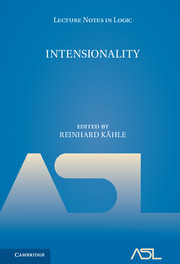Book contents
- Frontmatter
- Preface
- Contents
- The modal aether
- Possible worlds semantics for predicates
- A context principle
- The semantics of modal predicate logic II. Modal individuals revisited
- Intensionality and coercion
- Intensionality in philosophy andmetamathematics
- Representation theorem for models of dynamic intensional logic
- Intension, intention
- Modality, mood, and descriptions
- Coercion vs. indeterminacy in opaque verbs
- References
Possible worlds semantics for predicates
Published online by Cambridge University Press: 30 March 2017
- Frontmatter
- Preface
- Contents
- The modal aether
- Possible worlds semantics for predicates
- A context principle
- The semantics of modal predicate logic II. Modal individuals revisited
- Intensionality and coercion
- Intensionality in philosophy andmetamathematics
- Representation theorem for models of dynamic intensional logic
- Intension, intention
- Modality, mood, and descriptions
- Coercion vs. indeterminacy in opaque verbs
- References
Summary
Abstract. We develop possible worlds semantics for as a predicate rather than as an operator of sentences. The unary predicate symbol is added to the language of arithmetic (or an extension thereof); this yields the language. Every world in our possible worlds semantics is the standard model of arithmetic plus an interpretation of. We investigate possible–worlds models where is true at a world w if and only if A is true in all worlds seen by w. The paradoxes exclude certain frames from being frames foras a predicate. We provide some sufficient and also some necessary conditions on frames that are allowed to act as frames for the predicate approach. Completeness results for certain infinitary systems corresponding to well known modal operator systems are established. We draw some conclusions concerning the current state of the predicate approach to modalities.
Modalities as predicates. Modalities like necessity and possibility, may be analysed logically in essentially two ways: either as predicates, or as operators. In the first case they are applied to singular terms, whereas in the second case they are applied to formula, but in both cases the application gives us new formula. Thus the distinction between the operator and the predicate conception of necessity is made on the syntactical level at first. Both conceptions are tied to certain semantics respectively. If “necessary” and “possible” are regarded as predicates, they are interpreted as properties of objects and a decision has to be made concerning what precisely they should be predicates of: syntactical entities like sentences, or contents of syntactical entities like propositions (let us ignore further options like utterances or mental objects). In either case, necessity and possibility are properties of such entities, or, perhaps, relations between such entities and further objects. If “necessary” and “possible” are regarded as operators, they do not express properties or relations like predicate and relation expressions; necessity does not apply to anything— much like the logical connectives or the quantifiers. In this sense the operator conception of necessity is radically deflationary. Similar considerations apply not only to necessity but also to the notions of knowledge, belief, future and past truth, obligation and so on, which have been treated in analogous fashions as necessity.
- Type
- Chapter
- Information
- Intensionality , pp. 20 - 41Publisher: Cambridge University PressPrint publication year: 2005
References
- 1
- Cited by



